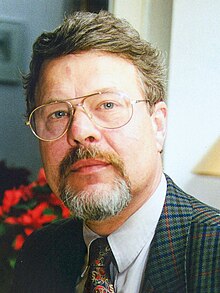Jürgen Hoika
Jürgen Alfred Josef Hoika (born June 4, 1941 in Oranienburg ; † February 1, 2005 in Schleswig ) was a German prehistoric historian who did a great job researching the Neolithic past, particularly of Schleswig-Holstein .
Life
Jürgen Hoika studied in Marburg and Cologne , where he received his PhD in 1970 with the dissertation "The Middle Neolithic Funnel Beaker Culture (TBK) on the Wagrien Peninsula and its Relationship to the Danish Islands". rer. nat. received his doctorate. After six months as a research assistant in Hamburg , in 1971 he went to the Schleswig-Holstein State Museum for Prehistory and Protohistory (today the State Archaeological Museum in the Schleswig-Holstein State Museum Foundation, Schloss Gottorf) in Schleswig. Here he found a stimulating sponsor in Karl Wilhelm Struve and in 1981 he became senior scientific adviser.
The focus of his work was the Nordic Neolithic with its funnel cup culture and its dolmens . He placed particular emphasis on the inclusion and use of scientific methods to determine the Neolithic environment and the qualification and dating of finds.
Jürgen Hoika was married to Eveline Hoika and had a daughter and a son.
Volunteering
On October 25, 1969, Hoika was a founding member of the " German Society for Prehistory " (DGUF), from 1991 to 1995 its deputy chairman and from 1995 to 1997 its chairman. On his initiative, the DGUF's scientific advisory board was created and the German Archeology Prize established.
Fonts
- Neolithic settlement remains from Oldenburg - Dannau, Ostholstein district . Offa 38 (Festschrift Karl Wilhelm Struve), 1981, 51-83.
- The Middle Neolithic at the time of the Funnel Beaker Culture in Northeast Holstein . Studies on archeology and landscape history. Offa books 61. Neumünster 1987.
- Jürgen Hoika and Harald Lübke, General information on the Bebensee LA 76 site . In: Harald Lübke, The Stone Age sites Bebensee LA 26 and LA 76, Segeberg district. Part I: The Stone Artifacts. Technological-ergological studies on the Nordic Early Neolithic. Investigations and materials on the Stone Age in Schleswig-Holstein 3. Schleswig-Neumünster 2000.
- Hunters become farmers. Schleswig-Holstein on the way to the Neolithic Age . Booklet accompanying the exhibition. Association for the promotion of the Archaeological State Museum eV, Schleswig 2001.
literature
- Jutta Meurers-Balke , Werner Schön (Hrsg.): Past times. Liber Amicorum. Commemorative letter for Jürgen Hoika. Habelt, Bonn 2012, ISBN 978-3-7749-3761-1 . Also available in Open Access:
Web links
- Digital archeology. Jürgen Hoika's estate
- "He was a very, very hard-working man" - conversation between Dr. Werner Schön, editor of the memorial, and Eveline Hoika, widow Jürgen Hoikas, in May 2011.
Individual evidence
- ↑ founding document DGUF with Hoikas signature www.dguf.de; accessed on August 8, 2020.
- ↑ Werner Schön, Eveline Hoika: "He was a very, very hard-working man". In: DGUF.de. German Society for Prehistory and Early History, accessed on December 3, 2019 .
| personal data | |
|---|---|
| SURNAME | Hoika, Jürgen |
| ALTERNATIVE NAMES | Hoika, Jürgen Alfred Josef (full name) |
| BRIEF DESCRIPTION | German prehistory and early historian |
| DATE OF BIRTH | June 4, 1941 |
| PLACE OF BIRTH | Oranienburg |
| DATE OF DEATH | February 1, 2005 |
| Place of death | Schleswig |
